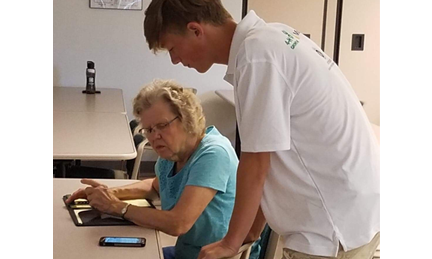Can you help me with my computer?As teenagers, I and many others are all too familiar with this question. Often teenagers are asked to help adults with technology-based questions, such as, “How do I download my photos?” or “How can I get onto Facebook?” Although we try to help, our advice often leaves the adult confused or frustrated with their technology. To help solve that dilemma, I have created this list of five easy ways teens can help adults improve their digital skills. These are recommendations that have worked for me in our 4-H Tech Changemakers program.
Get them interested! Though often overlooked, keeping the adult’s interest is essential to teaching them how to improve their digital skills and overcome the tech issues they may face in the future. To spark their interest, you should explain the relevance of your lesson. If the adult is aware of how the information is relevant to them, then they will be more attentive and more patient throughout your teachings.
Build comprehension by relating the topic to what they are familiar with. When teaching adults to improve their digital skills, it’s helpful to use analogies that relate to the subject you are teaching and to something they already understand. A few examples include comparing a computer virus to a real virus, a web address to a street address, and an email to a real-life mailbox.
Take it slow. Many adults who are new to technology can find it to be very intimidating. As their digital guide, it is important to go slow through your lesson to ensure that you do not overwhelm the adult. Always remember to be patient, use understandable language, and allow them time to process the information, as well as to ask questions. It is important to remember that even one bad experience could be enough to turn the adult off to developing their digital skills. That is why it is essential to take their technology training slow.

Inspire them to continue learning. Becoming proficient with the use of technology isn’t easy, and like anything else is going to take lots of practice. So, what’s a better way to have the adult practice than on a website or program of their choice! While some programs will be more beneficial than others for the adult, they all serve the purpose of getting them excited and asking questions about their technology. A few popular websites to spark their interest include Facebook (for the social butterfly), Pinterest (for the crafty type), and Amazon (to make shopping easy).
Refer them to helpful websites for their future questions. Although you have walked them through their current predicament, the adult will have nowhere to go (but you) for future questions. To encourage digital independence, leave them with a few helpful websites where they will be able to find more resources, and continue developing their digital skills. A couple of recommended sites include YouTube and Techboomers.com.
These resources will help eliminate confusion and frustration while you’re teaching adults to improve their digital skills. Also, you will help make learning about technology more exciting and interactive. Now, whenever an adult asks you, “Can you help me with my computer?”, you can confidently say Yes!
















